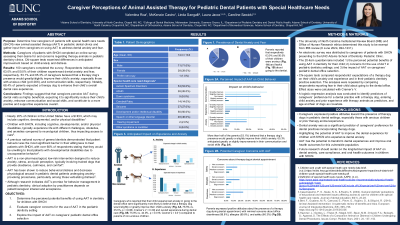Special Health Care Needs
262 - Caregiver Perceptions of Animal Assisted Therapy for Dental Patients with Special Healthcare Needs


Valentina Roa, BS
Fourth Year Dental Student
University of North Carolina, Chapel Hill, NC
UNC Adams School of Dentistry
Chapel Hill, North Carolina, United States- MC
Mckenzie Castro, BS
UNC Adams School of Dentistry
- LS
Linda Sangalli, DDS, MS, MS , PhD
Midwestern University

Caroline Sawicki, DDS, PhD
Assistant Professor
University of North Carolina
University of North Carolina
Chapel Hill, North Carolina, United States
Caroline Sawicki, DDS, PhD
Assistant Professor
University of North Carolina
University of North Carolina
Chapel Hill, North Carolina, United States
Presenting Author(s)
Co-Author(s)
Program Director(s)
Purpose: Determine how caregivers of patients with special health care needs (SHCN) view animal assisted therapy (AAT) in pediatric dental clinics and gather input from caregivers on using AAT to address dental anxiety and fear.
Methods: Caregivers of patients with SHCN completed an online survey assessing their desire for and concerns regarding therapy animals in pediatric dentistry clinics. Descriptive statistics and chi-square tests were used to analyze the findings.
Results: Thirty-nine caregivers completed the survey. The most common patients’ diagnoses reported by caregivers were autism spectrum disorder (62%), followed by developmental and/or intellectual disability (46%), speech or other language disorder (31%), and seizures (26%). Respondents indicated that respectively 60% and 54% of their children were anxious and scared about going to the dentist. 61% of caregivers believed that AAT would greatly/slightly improve their child’s anxiety. Almost three-quarters of respondents indicated that AAT would greatly/slightly improve their child’s overall experience at the dentist. Half the sample reported that AAT would greatly/slightly improve their child’s communication and social skills, while 69% of respondents believed AAT would constitute a fun and unique experience that would encourage their child to continue wanting to receive dental care. Caregivers whose child had a previous AAT experience were most likely to report that the presence of a therapy dog would make a difference in selecting a pediatric dentistry office (P=.002).
Conclusions: Findings suggest that most caregivers of patients with SHCN would welcome AAT in pediatric dental clinics and believe that AAT would have positive therapeutic effects.
Identify Supporting Agency and Grant Number:

.jpg)